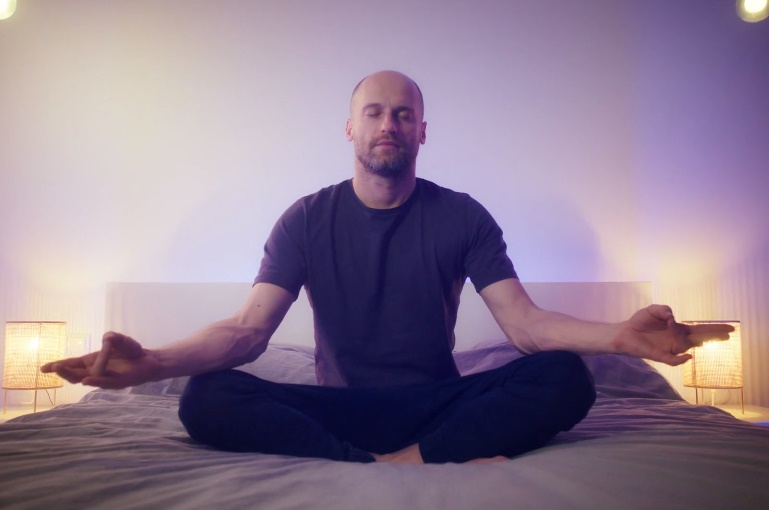In today’s fast-paced world, winding down at night can be a challenge. Yet, the way we end our day has a profound impact on the quality of our sleep, our mood, and our productivity the next day.
Today we’ll explore the ten best evening habits that can transform your nights into a rejuvenating experience. Whether you’re a night owl or an early bird, these habits are designed to cater to everyone.
1. Try the Unplugging
In an age of constant digital connectivity, taking a break from screens is not just a luxury—it’s a necessity.
Why Does Unplugging Matter?
Our brains are not designed to be constantly bombarded with information. Overexposure to screens, especially before bedtime, can disrupt our sleep cycle and increase stress levels.
The blue light emitted by screens interferes with the production of melatonin, a hormone responsible for regulating sleep. By reducing screen time, we give our minds the much-needed rest it deserves.
How to Unplug Effectively?
Start by setting a digital curfew at least an hour before your bedtime. This means no phones, tablets, or computers. Instead, engage in calming activities like reading a physical book or journaling.
Consider using apps or tools that remind you to wind down or even block access to distracting sites during your designated unplugging time.
2. Keep a journal of your activities
Journaling isn’t just for recording daily events. It’s a powerful tool for reflection, gratitude, and setting intentions.
Benefits of Evening Journaling
Journaling at night allows you to reflect on the day’s events, acknowledge your feelings, and set intentions for the next day. It acts as a mental detox, helping you process emotions and experiences.
Moreover, by focusing on gratitude, you cultivate a positive mindset, which can improve sleep quality and overall well-being.
Make It a Habit!
To make journaling a consistent habit, set aside a specific time each evening. Keep a dedicated journal and pen by your bedside to make the process seamless.
Start with simple prompts like, “Three things I’m grateful for today,” or “One lesson I learned today.” Over time, you’ll find that this practice becomes a cherished part of your night routine.
3. Mindful Meditation and Relaxation
Meditation isn’t just a morning activity. Incorporating it into your evening routine can pave the way for a restful night.
The Impact of Evening Meditation
Meditating in the evening helps to calm the mind, reduce anxiety, and prepare the body for sleep. It acts as a bridge between the hustle and bustle of the day and the tranquility of the night.
Studies have shown that regular meditation can improve sleep quality, reduce insomnia, and even enhance the overall quality of life.
Some extra tips
If you’re new to meditation, start with just a few minutes each night and gradually increase the duration. Find a quiet spot, sit comfortably, and focus on your breath. You can also use guided meditation apps or listen to calming music.
The key is consistency. Even a short session can make a significant difference in your night routine.
4. Nourish Your Body: Pay attention to your Nutrition
What we consume in the evening plays a pivotal role in how we sleep and how we feel the next morning. Eating the right foods before bed can promote better sleep and prevent nighttime awakenings.
On the contrary, heavy, spicy, or acidic foods can lead to discomfort and disrupt your sleep cycle. It’s not just about what you eat, but also when you eat. Consuming a large meal right before bed can lead to indigestion and sleep disturbances.
Best Foods for Evening Consumption
Opt for light, easily digestible foods in the evening. Foods rich in tryptophan, magnesium, and calcium can promote better sleep. Examples include bananas, almonds, yogurt, and chamomile tea.
Avoid caffeine, alcohol, and sugary foods, as they can interfere with your sleep. Remember, it’s always best to finish eating at least 2-3 hours before bedtime.
5. Find time for Skincare
Taking care of your skin isn’t just about aesthetics; it’s a ritual that can help you relax and wind down.
Benefits of Skincare
Nighttime is when our skin repairs and regenerates. An evening skincare routine ensures that your skin has all the nutrients it needs for this process.
Moreover, the act of applying skincare products can be therapeutic, signaling to your brain that it’s time to relax.
Crafting Your Routine
Start with a gentle cleanser to remove the day’s grime and makeup. Follow up with a toner, serum, and a night cream or oil. If you’re unsure about the products that are right for your skin type, consider consulting a dermatologist.
Remember, it’s not about the number of products but their efficacy and how they make you feel.
6. Reading – feel its magic!
In the digital age, the charm of reading a physical book remains unparalleled.
Why Is Reading Before Bed Beneficial?
Reading a physical book can be a great way to relax and escape the stresses of the day. It engages the brain in a different way than screens do, promoting relaxation and reducing stress.
Moreover, immersing yourself in a different world or learning something new can provide a sense of fulfillment and tranquility.
Tips for Choosing The Right Reads
Opt for books that are calming and not overly stimulating. Fiction, poetry, or light non-fiction can be great choices. Avoid intense thrillers or heavy academic materials that might keep your mind overly active.
Create a cozy reading nook with soft lighting to make the experience even more enjoyable.
7. Engage in light physical activity
While rigorous exercise is best reserved for earlier in the day, gentle movements in the evening can be a game-changer for relaxation.
Engaging in light physical activity can help release pent-up tension, improve circulation, and prepare your body for rest.
It can also be a way to transition from the day’s activities to a more peaceful evening, helping to signal to your body that it’s time to wind down.
Activities to Consider
Yoga, especially styles like Yin or Restorative, can be incredibly calming and grounding. Simple stretches can also help alleviate any stiffness from the day.
If you prefer, a leisurely walk outside can also be therapeutic, allowing you to connect with nature and get some fresh air before bedtime.
8. Craft a Sleep-Inducing Environment
Your environment plays a crucial role in the quality of your sleep. A cluttered or uncomfortable environment can be a significant barrier to quality sleep.
Factors like room temperature, lighting, and noise levels can directly impact how quickly you fall asleep and how deeply you rest. By optimizing your environment, you set the stage for a night of uninterrupted slumber.
How to Create a Restful Bedroom?
Ensure your room is dark, quiet, and cool. Consider blackout curtains, earplugs, or white noise machines if needed. Invest in a comfortable mattress and pillows.
Aromatherapy, using scents like lavender, can also promote relaxation. Lastly, keep your bedroom clutter-free to create a serene and inviting space.
9. Set Intentions for Tomorrow
By reflecting on what you hope to achieve the next day, you give yourself a clear direction. This not only aids in productivity but also allows you to start the day with purpose and motivation.
Moreover, by planning ahead, you can reduce morning stress and decision fatigue. Take a few minutes each night to jot down your top priorities for the next day.
Be realistic in your goals, ensuring they’re achievable. Consider pairing this with your evening journaling for a holistic reflection and planning session. Over time, this practice can lead to more productive and fulfilling days.
10. Embrace Gratitude and Positivity!
Ending the day on a positive note can set the tone for a restful night and a hopeful tomorrow. Gratitude has been linked to numerous benefits, from improved mental well-being to better sleep.
By focusing on the positive aspects of your day, you shift your mindset from what’s lacking or stressful to what’s abundant and uplifting in your life.
This not only fosters a sense of contentment but also reduces the anxiety and negative thoughts that can hinder sleep.
Cultivating a Gratitude Practice
Begin by listing three things you’re grateful for each evening. These don’t have to be monumental; even small joys or moments of connection can be profoundly impactful.
You can jot these down in a dedicated gratitude journal or simply reflect on them mentally. Over time, this practice can reshape your perspective, making you more attuned to the positive moments in your daily life.
The Importance of a Good Night’s Sleep
A good night’s sleep is paramount for numerous reasons, impacting various facets of our health, well-being, and daily functioning.
| Aspect | Importance of a Good Night’s Sleep |
|---|---|
| Physical Health | – Restoration: Repair and restore tissues, muscles, and synthesize proteins. – Growth: Vital for secretion of growth hormones. – Immune Function: Supports the immune system. – Balancing Hormones: Maintains balance of stress, appetite, and insulin-regulating hormones. |
| Mental Health | – Emotional Well-being: Reduces mood swings and irritability. – Reduced Risk: Lowers risk of disorders like depression and anxiety. |
| Cognitive Function | – Memory Consolidation: Helps in processing and storing new knowledge. – Improved Concentration: Enhances attention, decision-making, and creative thinking. |
| Safety | – Reduces Accidents: Sleep deprivation increases risk of accidents. – Better Coordination: Improves fine motor skills. |
| Longevity | – Reduced Risk: Lowers chances of obesity, diabetes, cardiovascular diseases, and some cancers. |
| Weight Management | – Appetite Regulation: Affects hunger-regulating hormones, influencing appetite and weight. |
| Enhanced Performance | – Physical Performance: Athletes experience better performance and reflexes. – Mental Agility: Enhances problem-solving skills and boosts creativity for students and professionals. |
For professional athletes, managing mental health is crucial, as their rigorous training and competitive environments can significantly impact their sleep patterns and overall well-being
FAQs:
How can I establish a consistent system when I have a fluctuating schedule?
Focus on core habits that you can do regardless of your schedule, such as disconnecting from screens and engaging in relaxation.
Is it better to have a fixed routine or switch it up occasionally?
A mix of both can be beneficial. A core routine with room for flexibility can accommodate different needs and situations.
How can I track the effectiveness of my system?
Keep a sleep journal to monitor your sleep quality, energy levels, and overall well-being after implementing your routine.
What is the ideal time to start with these steps?
Starting your night routine about an hour before your intended bedtime is usually recommended.
How can I create a personalized routine?
Consider your goals, preferences, and needs, then select habits that align with them.
Conclusion
Establishing a night routine is more than just a series of tasks; it’s about creating a ritual that signals to your mind and body that it’s time to wind down and prepare for rest.
By incorporating these ten habits into your evenings, you’re not only setting the stage for a better night’s sleep but also ensuring that you wake up refreshed, focused, and ready to embrace the day ahead.
Remember, consistency is key. As you make these habits a regular part of your routine, you’ll find that they become second nature, each evening becoming a time of relaxation, reflection, and rejuvenation.
Related Posts:
- 7 Effective Habits That Make You a Calmer Person
- 7 Mini Habits That Will Help You Become One Percent…
- The Ultimate Guide to Scalp Care for Hair Growth:…
- Can a Court Order a Psychiatric Evaluation? - Ultimate Guide
- 6 Best Hair Growth Oil in 2024 - Finding the Best…
- CBT: An Effective Mental Health Treatment - Best…






















